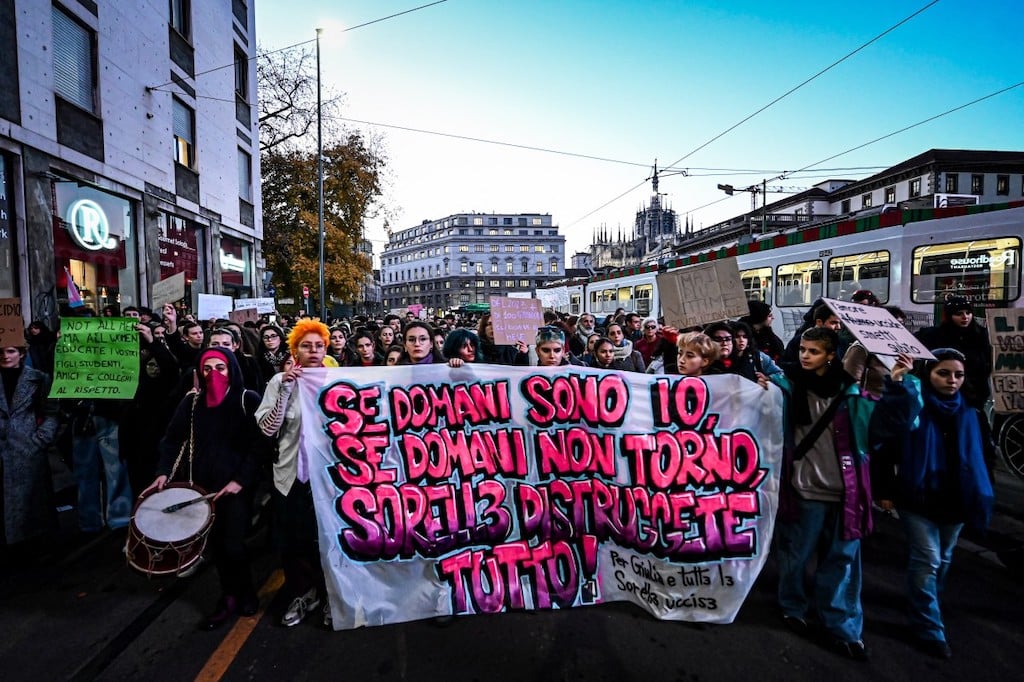Over the past few days, Italy has erupted in protests over the killing of 22-year-old university student Giulia Cecchettin by her ex-boyfriend.
Femicide isn’t a new phenomenon in Italy. By the time of Giulia’s killing, over 100 women had already been killed in Italy since the start of the year, 53 by a current or former partner.
While the country’s overall homicide rate has decreased in the past 20 years, femicide rates have stayed more or less the same, data from Italy’s national statistics agency Istat indicates.
READ ALSO: Tens of thousands march against gender-based violence in Rome
But the circumstances surrounding this latest killing, and the response to it, have been different.
Cecchettin was days away from sitting her final biomedical engineering exam when she and Filippo Turetto went missing after meeting at a mall in early November.
Though onlookers hoped the news story wouldn’t end in tragedy, her family’s comments that Filippo hadn’t wanted Giulia to graduate didn’t bode well.
When her body was found days later wrapped in black plastic at the bottom of a gully with over 20 stab wounds, Giulia’s sister, Elena, wrote a letter published in Italy’s Corriere della Sera newspaper calling for a revolution: “For Giulia, don’t hold a minute of silence. For Giulia, burn everything.”
People all over the country heeded that call: last week, students in high schools across Italy clapped and whistled during the minute of silence called by Italy’s Education Minister Giuseppe Valditara.
On Saturday, the International Day for the Elimination of Violence Against Women, tens of thousands marched in Rome in a show of anger and support. Earlier in the week, similar rallies were held in Milan, Padua – where Giulia attended university – and in other towns and cities across the country.
What sparked a national debate, however, is Elena’s assertion that her sister’s killer, who on Saturday was extradited to Italy after being apprehended by German police, is not a “monster” but a “healthy child of the patriarchy and of rape culture”.
Men everywhere must do a mea culpa, she went on to say in an interview, because “I’m sure that in your life there’s been at least one episode when you’ve disrespected a woman because she’s a woman… locker room banter is not OK.”
Her comments unleashed a torrent of abuse from local right-wing politicians, with Veneto regional councillor Stefano Valdegamberi lambasting the 24-year-old for delivering an “ideological message” and accusing her of wearing a sweatshirt with “satanic symbols”.
Men who kill aren’t a product of the patriarchy or toxic masculinity, another local councillor from Italy’s ruling Brothers of Italy party said in a Facebook post, but are “re-educated, deconstructed, feminised men.”
READ ALSO: Italian schools to tackle ‘machismo and sexism’ after student’s murder
“The sister of the unfortunate Giulia gets up on her soapbox and without anyone asking her, apportions guilt and dictates the rules that all men must slavishly follow,” he wrote.
On Wednesday, Italy’s senate passed a decree that increases protections for women – though opposition leader Elly Schlein said the law doesn’t go far enough, arguing that the government should focus on prevention, “that is, education in schools and resources for the training of specialised operators.”

Also on Wednesday, Valditara, Italy’s Minister of Education and Merit, announced that the government would spend €30 million on a course on gender relations in high schools.
The anti-gender violence network D.i.Re however said it was “deeply concerned” about the choice of psychologist Alessandro Amadori to spearhead the project, as D.i.Re’s president Antonella Veltri said Amadori was the author of a “substantially sexist and misogynistic book” in which he writes of a “conspiracy against men”.
“If these are the conditions for working on cultural change in schools, we will have to expect significant steps backwards in our society and ever-increasingly dangerous situations for women,” Veltri told journalists.
Though Italy’s far-right Prime Minister Giorgia Meloni has pledged to “continue on the path taken to stopping this barbarity”, Internazionale journalist Annalisa Camilli notes that a recent Action Aid report shows funding for anti-violence centres in Italy decreased by 70 percent between 2022 and 2023.
And earlier this year, Italy’s Brothers of Italy and League parties – two of the three members of its governing coalition – abstained from a vote asking the EU to ratify the Istanbul Convention, the first legally binding international treaty on preventing and combating violence against women.
In her open letter, Elena Cecchettin writes that “Femicide is state murder, because the state does not protect us.”
“We need widespread sex and effective education, we need to teach that love is not about possession.”



 Please whitelist us to continue reading.
Please whitelist us to continue reading.
Member comments